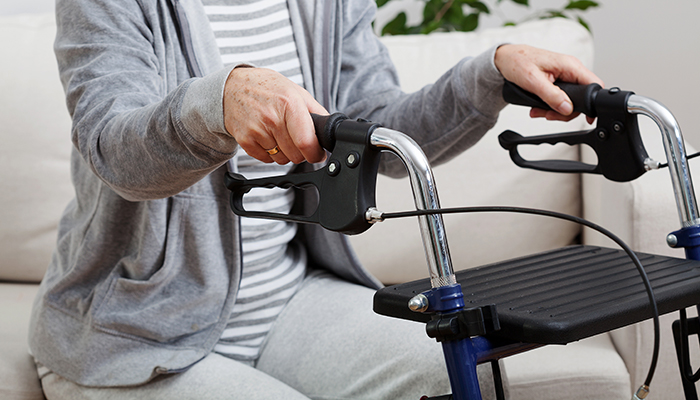Marsha Raines & Associates, LLC is now Aging Well Rochester
Our Monthly Newsletter
with helpful tips for family caregivers
December 2016/January 2017 Print
The joys of the holiday season are upon us. But also the stressors. This month we look at ways to make family visits more enjoyable for family caregivers. We also address issues pertaining to the frequent winter visitor: pneumonia. And then there’s medical equipment in the home. It can be a lifesaver, but it’s wise to get a consult so you are sure you are getting the correct model. Medicare will pay for only one, if that.
Preparing for your siblings' visit
 Your siblings, their partners, maybe their kids—everyone’s coming to see Mom and/or Dad. That’s happy news!
Your siblings, their partners, maybe their kids—everyone’s coming to see Mom and/or Dad. That’s happy news!
Should this be business? Would you rather it were pleasure? How about a little of both?
With some forethought and planning, you can make their visit meaningful on many levels.
Think about what you want. Then be sure to let your siblings know your “agenda.” Maybe it’s
- respite time. You’re the one always on the scene. Let your siblings take the lead for a while. Have a day to yourself, or an overnight out of town!
- specific chores done. Are there things you just never seem to get to, like cleaning out your parents’ closet or oiling the garage door opener? Make a wish list of tasks;
- discussion of care issues. If schedules and time zones make it impossible to talk with all your siblings at once, seize the opportunity. If there are thorny or complex issues to discuss, consider hiring a care manager to facilitate;
- playtime with siblings. You might want time to nurture your sibling relationships. Hire extra paid care and go shopping with your sister or take a walk with your brother.
Prepare yourself emotionally. Give some thought to any grievances you have with your siblings. Decide in advance how to handle your feelings with each individual. (Otherwise, you might just pop off with a snarky comment you later regret!) Here are two basic choices:
- Accept and let go. Look at the situation realistically. You might not be getting from him or her what you want, but they may be providing all that they can. Find other ways to have your needs met.
- Decide to talk about it. Arrange a time to talk privately with your sibling, and word your complaint without blame or anger. State what’s been uncomfortable for you and what you’d like to happen differently. Check out our article about constructively explaining your needs to others.
Preventing and treating pneumonia
 It’s flu season. That can mean pneumonia season is right around the corner. Pneumonia is an infection of the lungs that often develops after a cold or flu.
It’s flu season. That can mean pneumonia season is right around the corner. Pneumonia is an infection of the lungs that often develops after a cold or flu.
As a general rule, pneumonia can be treated at home with prescribed medications and rest. But sometimes a case is so severe that it requires a stay in the hospital. More than 50,000 people die each year from pneumonia, most of them older adults.
Call the doctor if your loved one experiences
- difficulty breathing or shortness of breath;
- chest pain or pressure;
- fever of 102° or higher;
- cough that won’t go away (especially if it brings up yellow or green mucus).
Prevention
- Get the two pneumonia vaccines. There are two shots, each targeting different bacteria, and they should be taken one year apart. Only 61% of older adults have received even one pneumonia vaccine. Talk to the doctor to find out what your relative needs to be current.
- Get a yearly flu vaccine. Avoiding influenza helps prevent pneumonia as well. The flu virus changes every year, so the vaccine should be updated. It’s best to get vaccinated by November, but December is better than no vaccine at all!
- WASH YOUR HANDS! This is the single most important thing you can do at home to prevent the spread of infection. It is especially important during cold and flu season.
- Clean surfaces, door knobs, and sink and toilet handles. These are common household locations where germs transfer easily.
- Avoid touching eyes, nose, and mouth. Germs gathered by the hands enter the body through these mucus membranes.
- Cough into a tissue or the sleeve of the upper arm. Controlled coughing reduces the spray.
- Limit contact with smoke. Encourage your relative to stop smoking. Have others smoke outside.
Medical equipment at home
Many people need specialized equipment in order to handle a serious injury or chronic condition. Examples include walkers, wheelchairs, blood sugar monitors, infusion pumps, CPAPs for sleep apnea, and hospital beds.
If the equipment will be needed for a long time, it may qualify as “durable medical equipment” (DME). And Medicare may pay for it. There are quite a few rules and restrictions. Check Medicare’s list before you buy!
To qualify under Medicare, durable medical equipment must be
- prescribed by a doctor who is enrolled in Medicare;
- used to treat or manage a qualifying medical problem or condition (your loved one’s diagnoses determine whether the equipment is “medically necessary”);
- meant to last at least three years (is “durable”); and
- used at home (whether that is a house or apartment, or in a facility).
It is important to choose DME carefully. You need to ensure the equipment will truly meet your loved one’s needs, now and in the foreseeable future. Ask the doctor (or discharge planner at a facility) for a home assessment by a physical or occupational therapist. This gives you the opportunity for guidance on issues such as
- space in the home. One model may work better than another.
- ease of use. Who will be operating the equipment? Is Dad mentally sharp enough to learn how? What must be done in the case of a power failure?
- being strategic about cost. Before ordering equipment, be sure you understand the rules. For example, Medicare will pay for ONE mobility device every five years. Better they pay for a wheelchair and you buy the less expensive shower chair or walker. Medicare won’t pay for both.
As with all Medicare Part B charges, the patient will be responsible for a copay. And make sure the DME supplier accepts Medicare. Otherwise, you’ll be footing the whole bill!
